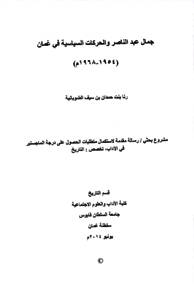Document
الحركة القومية العربية في الخليج العربي (1948-1968).
Identifier
الضويانية, رنا بنت حمدان بن سيف (2020).الحركة القومية العربية في الخليج العربي (1948-1968) (رسالة دكتوراة، جامعة السلطان قابوس، مسقط، عمان).
Other titles
The Arab Nationalist Movement in Arabian Gulf Region (1948-1968)
Publisher
جامعة السلطان قابوس.
Gregorian
2020
Language
Arabic
English abstract
This study aims to provide a well-thought-out insight into the track of political and
intellectual changes, which the Arabian Gulf region underwent during the study timeframe
(1948-1968), and which had witnessed the emergence of Arab nationalist political
organizations that largely affected the political trends and ideologies in the Arabian Gulf
region over the subsequent period. The study sheds light on the most prominent Arab issues,
which the Arab Nationalist Movement in the Arabian Gulf region both fostered and advocated
with popular movement and tangible support. Moreover, the study further clarifies the factors
that affected the Arab nationalist organizations in the Arabian Gulf region, and which
eventually led them to retreat as political organizations, most evidently in the wake of the Arab
defeat in their war against the Zionist enemy in June 1967, and which had effects that extended
over the subsequent years. This defeat gave rise to a breakup within the parent Arab Nationalist
Movement, thus bringing into light leftist movements that adopted the Marxist ideology.
To achieve the study objectives, the researcher adopted the descriptive analytical method,
through presenting the historical developments of the Arab Nationalist Movement in the
Arabian Gulf region, analyzing the historical data and events, and interpreting them to
ultimately reach the conclusions required. In her study, the researched relied on contemporary
sources and references, including, among others, Arab and foreign publications, and books, in
addition to interviews with persons who lived during the period of study and those who were
both part of the events and involved in the Arab Nationalist Movement.
The study is divided into an introductory chapter, three chapters and a conclusion. The
introductory chapter tackles the political and ideological conditions in the Arabian Gulf region
that fostered the Arab nationalism shortly ahead of the emergence of the movement as a
political trend. These conditions played a remarkable role in raising the political awareness of
the people of the region. Chapter One focuses on the popular movement that turned into a
political movement creating a fertile ground for the spread of the Arab nationalism politically,
with the emergence of national organizations whose activity emerged in the Arabian Gulf
region in the 1950s. Chapter 2 examined the position of Arab nationalist organizations in the
Arabian Gulf region towards Arab issues, including: the Arab-Israeli conflict and Syrian Egyptian unity in 1958, as well as the ideological repercussions of these organizations in the
Arabian Gulf region. Chapter 3 addresses the decline of Arab Nationalist Movement in the
Arabian Gulf region; its causes, forms and repercussions specifically following the Arab defeat
in June 1967, which gave rise to deviations and abandonment of Arab nationalism ideology,
and to the emergence of left-wing parties that adopted Marxism as an ideology.
The study has reached a wide variety of conclusions, most notably: There had been a number
of Arab nationalist organizations that engaged in political and ideological activities in the
Arabian Gulf region representing the Arab nationalism activity, such as the Arab Nationalist
Movement, the Arab Socialist Ba'ath Party, and Nasserism. Nevertheless, the study
demonstrated that despite the convergence of ideas and political orientations among the Arab
nationalist organizations in the Arabian Gulf region, they did not unite in one Arab nationalist
party, due to internal conflicts among those organizations which were not established on an
ideological or political basis. The study also explains that the defeat of Arabs in the Arab Israeli war, June 1967 was a turning point in the Arab nationalism ideology, its strategies, and
the principles on which it was based since its very inception and rising. This defeat has affected
the Arab nationalist organizations in the Arab and Arabian gulf regions, where a number of
leftist movements split from the Arab Nationalist Movement adopting the Marxist ideology in
their struggle against colonialism and the obsolete Arab regimes. The study showed that
despite the decline of the Arab Nationalist Movement in the Arabian Gulf region, it has a
marked role in building the ideological and political awareness and in leading the liberation
and struggle movements in the region. The Arab Nationalist Movement has had a profound
impact on the political experience across the Arabian Gulf region
Member of
Resource URL
Arabic abstract
تهدف هذه الدراسة إلى كشف التطورات السياسية والفكرية التي مرت بها منطقة الخليج العربي خلال الفترة (1948-1968م)، وتخلل ذلك ظهور تنظيمات قومية عربية أثرت على التوجهات السياسية والفكرية في منطقة الخليج العربي. وتبحث الدراسة أهم وأبرز القضايا العربية التي تبنتها الحركة القومية العربية في منطقة الخليج العربي، كما توضح الدراسة الانعكاسات التي طرأت على التنظيمات القومية في الخليج العربي بعد النكسة التي تعرض لها العرب أمام الكيان الصهيوني في حرب يونيو عام 1967م، وكيف أدت هذه الهزيمة إلى انشقاق الحركات القومية العربية، وظهور الحركات اليسارية التي تبنت الأيديلوجية الماركسية.
وقد اتبعت الباحثة المنهج الوصفي التحليلي لتحقيق أهداف هذه الدراسة، من خلال عرض التطورات التاريخية التي طرأت على الحركة القومية العربية في منطقة الخليج العربي معتمدة على المصادر المعاصرة كالوثائق والكتب العربية والأجنبية.
وقُسمت الدراسة إلى تمهيد وثلاثة فصول وخاتمة. وتناول التمهيد الأوضاع السياسية والفكرية في منطقة الخليج العربي التي عززت من الشعور القومي العربي قبيل ظهور الحركة كاتجاه سياسي، حيث أدت هذه الأوضاع دورًا ملموسًا في زيادة الوعي السياسي. وركز الفصل الأول على الحراك الشعبي الذي تحول إلى حراك سياسي وخلق بيئة خصبة لانتشار هذا التوجه القومي سياسيًا، بظهور تنظيمات قومية برز نشاطها في منطقة الخليج العربي في خمسينيات القرن العشرين.
وفيما اختص الفصل الثاني بدراسة موقف التنظيمات القومية العربية في منطقة الخليج العربي تجاه القضايا العربية، منها: الصراع العربي الاسرائيلي، والوحدة العربية السورية- المصرية في عام 1958م، والانعكاسات الفكرية لهذه التنظيمات في منطقة الخليج العربي. وعالج الفصل الثالث انحسار الحركة القومية العربية في منطقة الخليج العربي: أسبابها، وأشكالها وتداعياتها لاسيما بعد هزيمة العرب أمام الكيان الصهيوني في يونيو عام 1967م، إذ أثرت هذه الهزيمة في ظهور انحرافات في الحركة القومية بالابتعاد عن الفكر القومي، والاتجاه إلى تشكيل أحزاب وحركات يسارية اتخذت من الأيديولوجية الماركسية توجهاً فكريًا لها.
وتوصلت الدراسة إلى مجموعة من النتائج أهمها: وجود عدد من التنظيمات القومية التي مارست نشاطًا سياسيًا في منطقة الخليج العربي، والتي تبنت أفكارًا ورؤى مثل: حركة القوميين العرب، وحزب البعث العربي الاشتراكي، والناصرية. وأكدت الدراسة اهتمام شعب الخليج العربي بالقضايا العربية، وتبنيه لها وذلك من خلال المشاركة المادية والمعنوية التي قدمتها الأحزاب والحركات القومية في المنطقة، نقطة تحول في الفكر القومي واستراتيجياته والمبادئ التي قام عليها منذ نشأته ونشاطه في منطقة الخليج العربي، حيث انشقت عن الحركة القومية عدد من الحركات اليسارية التي تبنت الأيديولوجية الماركسية، وسيلة في نضالها ضد الاستعمار والأنظمة العربية الحاكمة المتمسكة بالأصول التقليدية
وقد اتبعت الباحثة المنهج الوصفي التحليلي لتحقيق أهداف هذه الدراسة، من خلال عرض التطورات التاريخية التي طرأت على الحركة القومية العربية في منطقة الخليج العربي معتمدة على المصادر المعاصرة كالوثائق والكتب العربية والأجنبية.
وقُسمت الدراسة إلى تمهيد وثلاثة فصول وخاتمة. وتناول التمهيد الأوضاع السياسية والفكرية في منطقة الخليج العربي التي عززت من الشعور القومي العربي قبيل ظهور الحركة كاتجاه سياسي، حيث أدت هذه الأوضاع دورًا ملموسًا في زيادة الوعي السياسي. وركز الفصل الأول على الحراك الشعبي الذي تحول إلى حراك سياسي وخلق بيئة خصبة لانتشار هذا التوجه القومي سياسيًا، بظهور تنظيمات قومية برز نشاطها في منطقة الخليج العربي في خمسينيات القرن العشرين.
وفيما اختص الفصل الثاني بدراسة موقف التنظيمات القومية العربية في منطقة الخليج العربي تجاه القضايا العربية، منها: الصراع العربي الاسرائيلي، والوحدة العربية السورية- المصرية في عام 1958م، والانعكاسات الفكرية لهذه التنظيمات في منطقة الخليج العربي. وعالج الفصل الثالث انحسار الحركة القومية العربية في منطقة الخليج العربي: أسبابها، وأشكالها وتداعياتها لاسيما بعد هزيمة العرب أمام الكيان الصهيوني في يونيو عام 1967م، إذ أثرت هذه الهزيمة في ظهور انحرافات في الحركة القومية بالابتعاد عن الفكر القومي، والاتجاه إلى تشكيل أحزاب وحركات يسارية اتخذت من الأيديولوجية الماركسية توجهاً فكريًا لها.
وتوصلت الدراسة إلى مجموعة من النتائج أهمها: وجود عدد من التنظيمات القومية التي مارست نشاطًا سياسيًا في منطقة الخليج العربي، والتي تبنت أفكارًا ورؤى مثل: حركة القوميين العرب، وحزب البعث العربي الاشتراكي، والناصرية. وأكدت الدراسة اهتمام شعب الخليج العربي بالقضايا العربية، وتبنيه لها وذلك من خلال المشاركة المادية والمعنوية التي قدمتها الأحزاب والحركات القومية في المنطقة، نقطة تحول في الفكر القومي واستراتيجياته والمبادئ التي قام عليها منذ نشأته ونشاطه في منطقة الخليج العربي، حيث انشقت عن الحركة القومية عدد من الحركات اليسارية التي تبنت الأيديولوجية الماركسية، وسيلة في نضالها ضد الاستعمار والأنظمة العربية الحاكمة المتمسكة بالأصول التقليدية
Category
Theses and Dissertations



